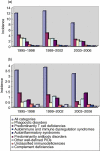The European internet-based patient and research database for primary immunodeficiencies: results 2006-2008
- PMID: 19630863
- PMCID: PMC2715433
- DOI: 10.1111/j.1365-2249.2009.03954.x
The European internet-based patient and research database for primary immunodeficiencies: results 2006-2008
Abstract
Primary immunodeficiencies (PID) are rare diseases; therefore transnational studies are essential to maximize the scientific outcome and to improve diagnosis and therapy. In order to estimate the prevalence of PID in Europe as well as to establish and evaluate harmonized guidelines for the diagnosis and treatment of PID, the European Society for Immunodeficiencies (ESID) has developed an internet-based database for clinical and research data on patients with PID. This database is a platform for epidemiological analyses as well as the development of new diagnostic and therapeutic strategies and the identification of novel disease-associated genes. Within 4 years, 7430 patients from 39 countries have been documented in the ESID database. Common variable immunodeficiency (CVID) represents the most common entity, with 1540 patients or 20.7% of all entries, followed by isolated immunoglobulin (Ig)G subclass deficiency (546 patients, 7.4%). Evaluations show that the average life expectancy for PID patients varies from 1 to 49 years (median), depending on the type of PID. The prevalence and incidence of PID remains a key question to be answered. As the registration progress is far from finished we can only calculate minimum values for PID, with e.g. France currently showing a minimum prevalence of 3.72 patients per 100,000 inhabitants. The most frequently documented permanent treatment is immunoglobulin replacement; 2819 patients (42% of all patients alive) currently receive this form of treatment.
Figures




References
-
- Fischer A. Trends in primary immunodeficiencies. Keynote lecture at the ESID meeting in 's-Hertogenbosch. October.
-
- Stray-Pedersen A, Abrahamsen T, Froland S. Primary immunodeficiency diseases in Norway. J Clin Immunol. 2000;20:477–85. - PubMed
-
- Kirkpatrick P, Riminton S. Primary immunodeficiency diseases in Australia and New Zealand. J Clin Immunol. 2007;27:517–24. - PubMed
-
- Matamoros N, Llambi JM, Espanol T, et al. Primary immunodeficiency syndrome in Spain: first report of the National Registry in children and adults. J Clin Immunol. 1997;17:333–9. - PubMed
Publication types
MeSH terms
Substances
LinkOut - more resources
Full Text Sources
Research Materials

